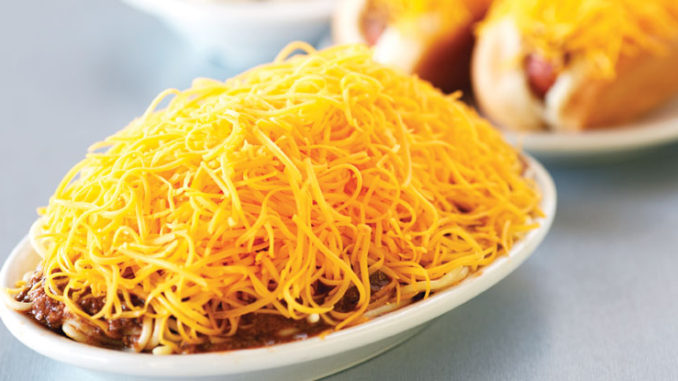
Back to the Future
Gold Star reinvents itself to re-include burgers and more
By David Holthaus
In 1965, the Daoud brothers, Dave, Charlie, Frank and Basheer, pooled their money to buy a diner called Hamburger Heaven in Cincinnati’s Mount Washington neighborhood. Despite its name, Hamburger Heaven was one of the few restaurants in that part of town serving Cincinnati-style chili at the time.
Recognizing Cincinnatians’ love of the unique concoction, the brothers dropped the burgers from the menu; in fact, they dropped most of the menu to focus on the spicy chili and the recipes made with spaghetti, cheese, beans and onions, the now familiar three- four- and five-way creations that Cincinnati has become known for. That single restaurant expanded over the years into Gold Star Chili, a chain of chili parlors that at one time numbered more than 100 in Greater Cincinnati.
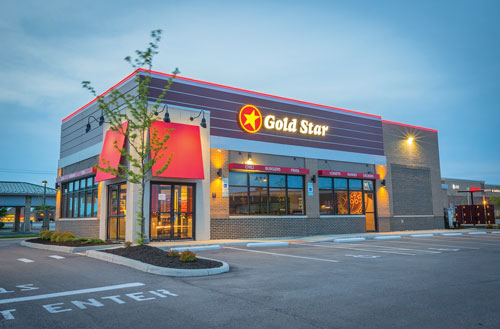
Today, as part of a broader restaging of the 55-year-old chain, CEO Roger David, son of Charlie Daoud, is going back to the future and bringing back the fresh, made-to-order burgers, with its own “Heavenly” special sauce and paired with its all-American partners, fries and milk shakes.
It’s one piece of the overall strategy to expand the brand and differentiate the chain from its chief competition, Skyline Chili.
Part of the effort is a slight name change.
“I removed ‘chili’ from our logo,” David says. “It’s something my uncles still cringe over. So now we’re just ‘Gold Star.’”
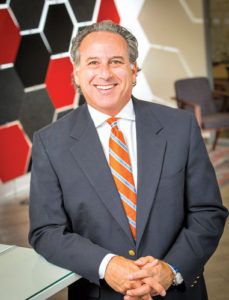
Gold Star is now more than chili, although the Cincinnati variety is still its bread and butter, or its ground beef and spice you might say.
In 2017, the company entered a new market with its purchase of Tom and Chee, a concept that started as a food truck, hit it big with an appearance on Shark Tank, and then expanded with its menu of creatively made grilled cheese sandwiches and soup.
David and his team were looking for another dining concept that they could grow. “We recognized Tom and Chee as another Cincinnati brand and people were very passionate about it,” he says.
“They tapped into a niche that was not being served,” David says. “Something very simple, but they were executing it in a more sophisticated manner.”
But they expanded too fast, without the back-office infrastructure to provide enough marketing and operations support to their franchisees, David says. Differently sized stores created costly overhead and the menu became too difficult for customers to navigate.
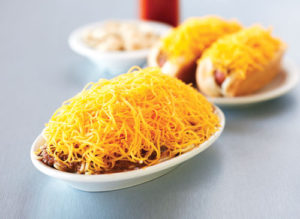
After buying it, “We resized the footprint and brought the investment level down for franchisees,” David says. “We re-engineered the workflow and equipment, tweaked the logo and addressed the menu.”
The sandwiches, ranging in price from $6.99 to $7.99, are no longer called “grilled cheese,” but the more substantive “melts” instead. “Calling them grilled cheese and trying to get those dollars was a value issue for some of the past guests,” David says.
Tom and Chee now has 11 franchised locations in seven states, and a 12th, this one company-owned, is in the pipeline.
“That brand, we think, can play more nationally,” David says. “With that brand, it’s more where do we want to grow and who are the partners we want to fuel that growth.”
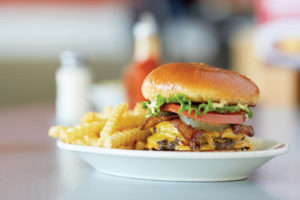
The purchase of Tom and Chee led to the creation of a new organizational structure that could encompass both brands and allow for further expansion or acquisition into new markets or formats.
GSR Brands, created earlier this year, became the parent organization of both brands. “We needed to create a holding company, an organization that both of these brands could live under,” David says.
The holding company will allow for possible future acquisitions as well, David says.
“We’ll look at other concepts and day parts,” he says. One day part he’s currently eyeing is the 6 a.m. to 2 p.m. breakfast and lunch dining concept.
As for the 55-year-old Gold Star brand, it needed retooling. Skyline dominates the Cincinnati chili scene, so Gold Star needed to differentiate itself while keeping true to its chili parlor heritage.
Over the past few years, the company has invested $25 million into its stores and marketing. Much of that was spent on a store redesign of the dining space as well as the kitchen and work areas. The new design is being rolled out to new locations.
“We needed to be more current and not abandon our heritage,” David says. “We’re telling the brand story in a more contemporary atmosphere.”
The company also created a format for online ordering and delivery.
With the new menu and the new look, the Gold Star brand still has room to grow, with the core market being within a 100-mile radius of Cincinnati.
“I’ve created a concept that I believe will be more successful in a 100-mile radius of Cincinnati than what we had before,” he says. “In addition, I’ve created meaningful differentiation right here in our home market.”
The company recently hired a franchise development director to attract new franchisees for both brands, and to prospect for and qualify new and existing franchisees and track their progress. It also hired a field marketing manager to work with franchisees on brand marketing, communications, advertising and public relations.
David has also hired a director of training to develop and implement standard training programs across the brand for every franchise to use and to oversee new restaurant training, as well as training current employees before remodeled restaurants open to the public.
It’s part of a refocus on the in-store customer experience, to have guests leave with smiles on their faces, not only from the food but from the service.
“My family has always been known for hospitality,” David says. “We make you feel like family. Our vision is to live in a more hospitable world.”



